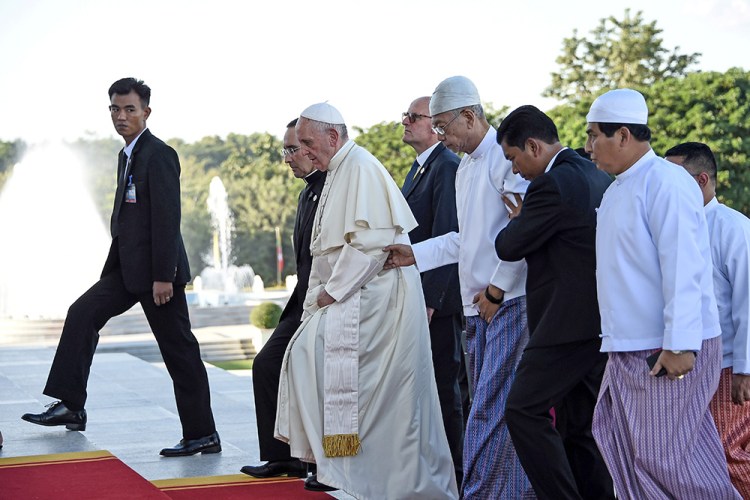Perhaps as important as what Pope Francis said during his key speech in Myanmar on Tuesday was what he didn’t say.
Speculation had mainly circled around the question of whether the pope would use the term “Rohingya” to describe the country’s Muslim minority, which has been the target of a brutal military “clearance operation.”
Rohingya Muslims are not officially recognized as a minority in Myanmar – also known as Burma – even though many have lived there for generations. Burmese officials – and many among the predominantly Buddhist population – reject “Rohingya” and are instead using “Bengalis” to emphasize their disputed argument that the Rohingya migrated illegally to the country from Bangladesh.
To the relief of some and the dismay of others, the pope refrained from using the term during an inter-faith meeting and in a subsequent speech on Tuesday which he gave following a meeting with Burmese leader Aung San Suu Kyi. The civilian Burmese leader has come under criticism for allegedly ignoring human rights violations in the country.
The pope did use his speech to urge respect for minority rights.
“The future of Myanmar must be peace, a peace based on respect for the dignity and rights of each member of society, respect for each ethnic group and its identity, respect for the rule of law, and respect for a democratic order that enables each individual and every group – none excluded – to offer its legitimate contribution to the common good,” the pope said, according to the BBC.
Pope Francis tweeted “I want my visit to embrace all the people of Myanmar and to encourage the building of an inclusive society.”
Myanmar’s small Catholic community had previously urged the pope to refrain from using the term Rohingya, as such a move would likely have been interpreted as foreign meddling in domestic affairs by the Burmese leadership.
But as a religious leader who has repeatedly defied the restraint his predecessors often showed, observers believed that Pope Francis could have still emphasized his support for the minority by deliberately using the factually correct but politically fraught term.
Pope Francis had already prayed for “our Rohingya brothers and sisters” ahead of his visit. Refraining from reusing the term while in Myanmar is now being criticized as a contradictory signal by a pope who has been a vocal supporter of refugees across the globe and was previously quoted as saying that he does not like “the contradiction of those who want to defend Christianity in the West, and, on the other hand, are against refugees and other religions.”
“The Pope missed an important opportunity to tell Myanmar that every group has the right to self-identify, and to publicly refute the unconscionable pressure by Aung San Suu Kyi and the Myanmar military to deny the Rohingya their identity,” Phil Robertson, the deputy Asia director of Human Rights Watch, wrote in an email.
Whereas some had hoped that the pope’s use of the term would have increased pressure on Myanmar’s leadership to refrain from further repression and violence targeting Rohingya Muslims, others feared that such a move could have escalated tensions further.
About 600,000 Rohingya Muslims had to flee across the border into Bangladesh in recent months, after the military targeted the minority. The U.S. government classified the violence as “ethnic cleansing” last week, and Secretary of State Rex Tillerson blamed the Burmese government, military and local vigilantes for “horrendous atrocities” in Myanmar’s western Rakhine state.
The Burmese military is denying any involvement in the atrocities, and members of other religious groups in the country, such as Buddhists and Hindus, claim that they were in turn the targets of violence by the Rohingya.
After meeting with the pope on Monday, Burmese military general Min Aung Hlaing wrote in a post on social media that there “is no religious discrimination in Myanmar as the country ensures religious freedom.”
He said that in the course of the meeting “the pope prayed for ensuring peace, tranquility and development of Myanmar.” From the post, it was unclear whether the pope had raised human rights concerns in the meeting.
He will meet some Rohingya Muslims in Bangladesh later on during his six-day visit, which ends on Saturday.
Although the trip was planned ahead of the most recent escalation of violence, which has lasted for more than three months, it is now inevitably being dominated by the ethnic cleansing or genocide allegations that the Burmese government and military are facing from the United Nations, the United States and other Western governments.
Myanmar’s Catholic Church leadership has also refrained from calling the violence against the Rohingya minority “ethnic cleansing” – likely due to fears of repercussions that the use of the term could have for the Catholic minority – just 650,000 in a country of 53 million.
Whereas the Vatican spokesman defended the pope’s use of the term as not being “a prohibited word” ahead of the visit, a senior Vatican diplomat, Cardinal Pietro Parolin, was careful not to mention it in a pre-visit interview.
Send questions/comments to the editors.



Success. Please wait for the page to reload. If the page does not reload within 5 seconds, please refresh the page.
Enter your email and password to access comments.
Hi, to comment on stories you must . This profile is in addition to your subscription and website login.
Already have a commenting profile? .
Invalid username/password.
Please check your email to confirm and complete your registration.
Only subscribers are eligible to post comments. Please subscribe or login first for digital access. Here’s why.
Use the form below to reset your password. When you've submitted your account email, we will send an email with a reset code.